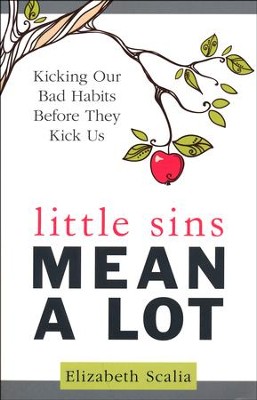Elizabeth Scalia's book "Little Sins Mean A Lot: Kicking Our Bad Habits Before They Kick Us" should come with a warning. You cannot read it without engaging in an examination of the soul.
When I first picked up “Little Sins Mean A Lot” by Elizabeth Scalia, I found myself convicted by the first (Procrastination), third (Self Neglect), and fourth chapter (Treat yourself), in that I could easily find my own justifications for my sloth in getting to paperwork and working out, and tendency to use if I worked out or did paperwork to indulge either my sweet tooth, or a shortcut in either housekeeping, sabotaging all the good I’d managed. Having bought the book when it first came out, I hoped to read through it and give a review but my disorganization and procrastination collaborated and I couldn’t find the book for three weeks.
Elizabeth’s earnest stories of her own discernment of how little sins injure our capacity to work with the Holy Spirit helped illustrate how to go about a serious examination of conscience and not stray into scrupulosity at the same time. Plowing through the chapters, I got indicted again by the gloominess and griping, but decided I should finish the book before running to the sacrament of Reconciliation to make sure I didn’t miss anything. Clinging to the narrative, guilty, passive aggressive, ow, make it stop, phoning it in…oh, you had to bring that up?
My youngest son has Down Syndrome. We’ve been considering applying for a service dog, and I have been the lone hold out. I even went so far as to acquire an application. It sat in my stack of stuff to get to for nine months because I didn’t want to write the essay at the end.
Writing is something I love, it comes easy to me, and I knew, I could nail that essay. I also knew, the number one person who would be taking care of any canine would be me. So the forms sat and sat and sat and sat until I read Scalia’s words discussing the application of the Holy Rule of Saint Benedict, “you leave nothing lie.” She went on, “when you close the window, you lock it; when you put away the broom; you put it away; you don’t just launch it into the garage.” I had papers lying there, but I wasn’t quite ready to let that push of the Holy Spirit push me over. Submitting an application would mean possibly a commitment to another living creature. I didn’t want to give it a chance…and then I got to chapter 12, “Sins of Omission.”
Her frank discussion of being unwilling to say yes (to a big yes, possibly taking on four children) made my balking at a service dog to my son feel like a super cop out. I ran through the reasons for, why were we seeking a dog for our son? We would be getting a dog for his companionship –I could already see his younger sister gravitate toward her older sisters, since they could share ideas he couldn’t. Having a service dog would also give my son a task, and he would need something he could do in the future, as more of his siblings grew away from the home, and entered into the busier outside world. A service dog would also provide a level of safety for Paul, and I’d need that little bit of help as he got bigger. I ran through the reasons why not, “I didn’t want to do the work.”
Sins of Omission are usually sins of saying “no” to the opportunity for grace. Grace always is given when we say “Yes,” and “Yes” usually means service. All service is a sublimation. I’d been refusing to sublimate to the point of refusing even to attempt to bring about a good for my son.
Long story short, I finished the book, went to reconciliation and wrote the essay.
Long story short, I finished the book, went to reconciliation and wrote the essay.
If we get a dog, it’s all Elizabeth Scalia’s fault.



No comments:
Post a Comment